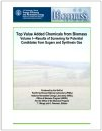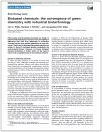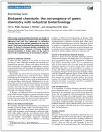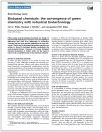What It Is:
Waste to Chemicals refers to transforming wastes and residues to energy, fuels and other useful, valuable materials.
How It Relates to Green Chemistry:
Finite fossil fuels are diminishing and becoming more economically and environmentally detrimental to extract. As the world’s population and resource consumption grows, waste generation has also increased dramatically. The idea of a “circular economy” has emerged, where products are made, used and re-used, rather than being discarded into a landfill. However, most of the systems needed to achieve circularity are not yet in place – or even designed.
Chemists and engineers must develop economically viable and sustainable resource solutions with responsible materials management, human health and environmental concerns in mind. The transformation of wastes (biomass, food, industrial, etc.) into fuels and other high-value chemicals is becoming a critical field of green chemistry.
-
- Prevention – creating a waste stream that is also a valuable feedstock prevents waste from entering the environment
- Maximize Resource Efficiency - depletion of finite resources can be minimized by using waste as a feedstock for new chemicals
- Design Systems Holistically and Using Life Cycle Thinking – designing chemicals and infrastructure so that waste can be used as a valuable chemical feedstock facilitates a truly circular material lifecycle
-
Levulinc Acid from Cellulose
Biofine (now DPS Biometrics, Inc.) developed a process to convert the waste cellulose in paper mill sludge, municipal solid waste, unrecyclable waste paper, waste wood, and agricultural residues into levulinic acid (LA). LA can be used as a building block for chemicals in many useful materials, including pharmaceuticals, food additives and plastics. LA made from waste cellulose reduces the use of fossil fuels and reduces the overall cost of LA from $4–6 per pound to as little as $0.32 per pound. In 2015, GF Biochemical opened a 10,000MT capacity plant to produce LA from biomass on an industrial scale. (PGCCA, 1999)
Biomass to Acids, Ketones and Alcohols
Professor Mark Holtzapple developed a family of technologies to convert waste biomass, such as sewage sludge and agricultural wastes, into animal feed products, industrial chemicals or fuels. Holtzapple hydrolyzed waste by treating it with lime, and the products could then be used as ruminant animal feeds, bio-adhesives or fed into large anaerobic germinators with rumen microorganisms for conversion to acids, ketones, or alcohols (PGCCA, 1996)
-
Advances in Bio-Derived Cosmetic Ingredients (Nexus, 2017)
GC&E Recap: From Waste to Wealth (Nexus, 2014)
-

Food Waste as a Valuable Resource for the Production of Chemicals, Materials and Fuels: Current Situation and Global Perspective (2013)
This paper explores the production of high-value products from 2nd generation food waste valorization strategies. New practices are compared to conventional food waste processing (ex. incineration), while issues linked to the use of food waste as a sustainable raw material are also highlighted.
Valorization of Food Residues—Waste to Wealth Using Green Chemical Technologies (2013)
A brief overview of the development and reach of sustainable food waste valorization practices
Top Value Added Chemicals from Biomass—Volume II: Results of Screening for Potential Candidates from Biorefinery Lignin (2007)
In this document, the U.S. Department of Energy assesses lignin’s potential and timeframe as a renewable raw material source for fuel, syn-gas, biobased macromolecules, aromatics and miscellaneous monomers.
Food Waste Valorisation for Sustainable Chemicals, Materials, and Fuels (EUBis) (2012)
A European-based program focused on bringing together researchers and stakeholders to harness the potential of food supply chain waste as an alternative carbon source to produce commercially viable chemical commodities.
Waste to Energy—Opportunities and Challenges for Developing and Transition Economies (2012)
This book provides a detailed overview of waste-to-energy and implementation approaches. The second half of the book includes several case study discussions from across the world, commenting both on research and applications.


